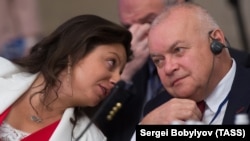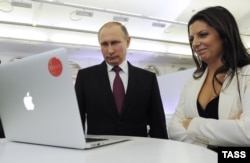On September 12, the Russian government-funded broadcaster RT published a piece on its website criticizing the U.S. government for investigating whether RT and another Russian state-funded media outlet, Sputnik, are in compliance with the Foreign Agents Registration Act (FARA). Citing several experts, RT accused the American authorities of resorting to censorship and impinging on free speech.
Originally adopted in 1938 to fight Nazi propaganda, FARA requires agents of foreign principals to identify themselves when operating in the United States. The act aims to ensure that the government and the people “are informed of the source of information (propaganda) and the identity of persons attempting to influence U.S. public opinion, policy, and laws.”
Registration under FARA is required for anyone acting “at the order, request, or under the direction or control, of a foreign principal” or who “engages within the United States in political activities for or in the interests of such foreign principal.”
Commenting on a reported U.S. Department of Justice letter asking the contractor for RT America to register as a foreign agent, RT’s Chief Editor Margarita Simonyan declared: “The American establishment’s war against our journalists is dedicated to all the starry-eyed who still believed in freedom of speech. It was killed by those who invented it."
The RT piece also quoted Sergei Sudakov, a Russian expert on U.S. affairs, as saying that the American democratic system is undergoing “very serious changes” linked to “a new type of understanding of democracy.”
“This is democracy, American style, which now means a democracy of barriers and a democracy of obstructions,” Sudakov said.
Sudakov claimed that forcing RT and Sputnik to register under FARA would amount to censorship, undermining the First Amendment of the U.S. Constitution, which protects free speech.
While neither RT nor Sputnik have registered as foreign agents in the United States, and they portray themselves as bona fide media outlets, both are suspected of spreading propaganda on the Kremlin’s behalf.
In testimony before the U.S. government’s Committee on Security and Cooperation in Europe on September 14, Broadcasting Board of Governors Director John Lansing said both RT and Sputnik are expanding their influence operations worldwide, including in the United States.
Lansing stressed that “the Kremlin propaganda machine is breathing new life into a strategy of dezinformatsiya, or disinformation, operations to influence opinions about the United States and its allies and partners.” These influence operations, he said, “strive to undermine the notion of objective truth and foster social divisions—delegitimizing Western democracies.”
During a U.S. House of Representatives’ Intelligence Committee hearing on Russian active measures held in March, the committee’s chairman, Rep. Devin Nunes, a California Republican, offered this assessment of RT’s operations: “[The] Kremlin is waging an international disinformation campaign through the RT propaganda network which traffics in anti-American conspiracy theories that rivaled the extravagant untruths of Soviet-era Pravda.”
Former U.S. Director of National Intelligence General James Clapper, for his part, underlined that “RT is essentially a propaganda mouthpiece for the [Russian] government, since the predominance of its funding comes from the government and the management is close to [President Vladimir] Putin.”
In January 2017, a U.S. intelligence report concluded that the Russian government used RT to undermine the U.S. democracy and influence the 2016 U.S. presidential election.
Both RT and Sputnik are among the targets ongoing investigations by the U.S. Congress and Department of Justice into Russia’s alleged interference in the presidential election.
“I'm very encouraged that the FBI is investigating the Sputnik news agency, which is funded by the Russian government. We can’t allow foreign agents, particularly those working on behalf of our adversaries, to skirt our laws,” U.S. Senator Jeanne Shaheen, a New Hampshire Democrat, stated on September 12.
The investigations and legal judgements aside, RT’s claims that U.S. democracy is being perverted and the U.S. government is censoring media are totally unfounded.
By ensuring RT’s and Sputnik’s compliance with FARA, the U.S. government underscores the importance of following and enforcing a legal framework befitting a properly functioning democracy.
It should be noted that FARA applies “equally to agents of friendly, neutral, and unfriendly governments,” allowing numerous outlets registered as foreign agents to operate freely. These include China Daily, Japan’s NHK Cosmomedia, and the Korean Broadcasting System (KBS), among others.
Likewise, if registered as foreign agents, RT and Sputnik will continue broadcasting without censorship. FARA and the U.S. Constitution ensure that.
Under FARA, foreign agents are simply required to disclose their links to a foreign principal, furthering the rights of U.S. citizens to know the sources of information.
FARA seeks to ensure that U.S. citizens have access to transparent news broadcasts, but it also operates within legal limits so as not to undermine free speech. This strengthens democracy.
RT and its experts, therefore, raise undue concerns while masking their true worry – that disclosure of their affiliation with the Russian government would undermine RT’s appeal and the Kremlin’s message.







